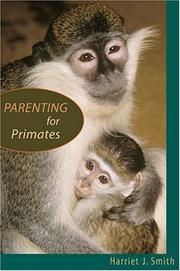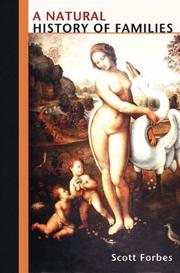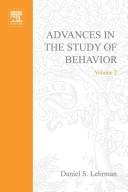| Listing 1 - 10 of 12 | << page >> |
Sort by
|
Multi
ISSN: 21628823 ISBN: 0120045257 9780120045259 Year: 1965 Volume: 42 Publisher: New York, NY : Academic Press
Abstract | Keywords | Export | Availability | Bookmark
 Loading...
Loading...Choose an application
- Reference Manager
- EndNote
- RefWorks (Direct export to RefWorks)
Advances in the Study of Behavior was initiated over 40 years ago to serve the increasing number of scientists engaged in the study of animal behavior. That number is still expanding. This thematic volume makes another important ""contribution to the development of the field"" by bringing together material that aggregates studies conducted on the behavior of tropical animals. Advances in the Study of Behavior is now available online at ScienceDirect--full-text online from volume 30 onward.
Parental behavior in animals --- Care of the young (Animal behavior) --- Maternal behavior in animals --- Parental care in animals --- Parenting in animals --- Paternal behavior in animals --- Paternalism in animals --- Animal behavior --- Cooperative breeding in animals --- Animal behavior. --- Human behavior. --- Psychology, Comparative. --- Behavior. --- Animaux --- Comportement humain --- Psychologie comparée --- Mœurs et comportement --- Maternal Behavior --- Paternal Behavior --- Animals
Book
ISBN: 1316490408 1316490629 1107338352 1316491943 131649084X 1316491064 1316489086 9781107338357 9781316491942 9781316491065 9781316491720 1316491722 9781107043435 1107043433 9781107642126 Year: 2016 Publisher: Cambridge
Abstract | Keywords | Export | Availability | Bookmark
 Loading...
Loading...Choose an application
- Reference Manager
- EndNote
- RefWorks (Direct export to RefWorks)
Cooperative breeders are species in which individuals beyond a pair assist in the production of young in a single brood or litter. Although relatively rare, cooperative breeding is widespread taxonomically and continues to pose challenges to our understanding of the evolution of cooperation and altruistic behavior. Bringing together long-term studies of cooperatively breeding birds, mammals, and fishes, this volume provides a synthesis of current studies in the field. The chapters are organised by individual studies of particular species or (in the case of mole-rats) two closely related cooperatively breeding species. Each focuses not only on describing behavior and ecology but also on testing evolutionary hypotheses for the form and function of the diverse and extraordinary cooperative breeding lifestyles that have been discovered. This unique and comprehensive text will be of interest to graduate students and researchers of behavioral ecology and the evolution of cooperation.
Parental behavior in animals. --- Animal societies. --- Social behavior in animals --- Care of the young (Animal behavior) --- Maternal behavior in animals --- Parental care in animals --- Parenting in animals --- Paternal behavior in animals --- Paternalism in animals --- Animal behavior --- Cooperative breeding in animals
Book
ISBN: 1281762458 9786611762452 0080559573 0123742854 9780123742858 9780080559575 Year: 2008 Publisher: Burlington, MA : Elsevier/Academic Press,
Abstract | Keywords | Export | Availability | Bookmark
 Loading...
Loading...Choose an application
- Reference Manager
- EndNote
- RefWorks (Direct export to RefWorks)
This book presents cutting edge research on the basic neurobiology of parental behavior as it relates to behavioral disorders, including postpartum depression, anxiety, and inadequate parental bonding to infants. Internationally recognized basic and clinical researchers present new research findings in humans and animals that elucidate the roles of the brain, physiological state, genes and environment in maternal and paternal care. By bridging the gap between basic and clinical research, new understandings of how the biology of the brain and the reproductive state of the parent impact their me
Parental behavior in animals --- Animal behavior --- Physiological aspects. --- Animals --- Animals, Habits and behavior of --- Behavior, Animal --- Ethology --- Animal psychology --- Zoology --- Ethologists --- Psychology, Comparative --- Care of the young (Animal behavior) --- Maternal behavior in animals --- Parental care in animals --- Parenting in animals --- Paternal behavior in animals --- Paternalism in animals --- Cooperative breeding in animals --- Behavior

ISBN: 0674043804 9780674043800 9780674019386 0674019385 0674019385 Year: 2009 Publisher: Cambridge, MA
Abstract | Keywords | Export | Availability | Bookmark
 Loading...
Loading...Choose an application
- Reference Manager
- EndNote
- RefWorks (Direct export to RefWorks)
In this natural history of primate parenting, Smith compares parenting by nonhuman and human primates. In a narrative rich with vivid anecdotes derived from interviews with primatologists, from her own experience breeding cottontop tamarin monkeys for over thirty years, and from her clinical psychology practice, Smith describes the ways that primates care for their offspring, from infancy through young adulthood.
Parenting. --- Primates --- Parental behavior in animals. --- Care of the young (Animal behavior) --- Maternal behavior in animals --- Parental care in animals --- Parenting in animals --- Paternal behavior in animals --- Paternalism in animals --- Animal behavior --- Cooperative breeding in animals --- Parent behavior --- Parental behavior in humans --- Child rearing --- Parent and child --- Parenthood --- Behavior.
Book
ISBN: 1283577313 9786613889768 0191637408 9780191637407 9780199692576 0199692572 9780199692583 0199692580 0191637416 9780191774737 0191774731 Year: 2012 Publisher: Oxford : Oxford University Press,
Abstract | Keywords | Export | Availability | Bookmark
 Loading...
Loading...Choose an application
- Reference Manager
- EndNote
- RefWorks (Direct export to RefWorks)
Parental care includes a wide variety of traits that enhance offspring development and survival. It is taxonomically widespread and is central to the maintenance of biodiversity through its close association with other phenomena such as sexual selection, life-history evolution, sex allocation, sociality, cooperation and conflict, growth and development, genetic architecture, and phenotypic plasticity.This novel book provides a fresh perspective on the study of the evolution of parental care based on contributions from some of the top researchers in the field. It provides evidence that the dyna
Parental behavior in animals. --- Evolution (Biology) --- Animal evolution --- Animals --- Biological evolution --- Darwinism --- Evolutionary biology --- Evolutionary science --- Origin of species --- Biology --- Evolution --- Biological fitness --- Homoplasy --- Natural selection --- Phylogeny --- Care of the young (Animal behavior) --- Maternal behavior in animals --- Parental care in animals --- Parenting in animals --- Paternal behavior in animals --- Paternalism in animals --- Animal behavior --- Cooperative breeding in animals
Book
ISBN: 1282660810 9786612660818 0520947207 9780520947207 9781282660816 9780520267138 0520267133 6612660813 Year: 2010 Publisher: Berkeley : University of California Press,
Abstract | Keywords | Export | Availability | Bookmark
 Loading...
Loading...Choose an application
- Reference Manager
- EndNote
- RefWorks (Direct export to RefWorks)
Mixed feelings about motherhood-uncertainty over having a child, fears of pregnancy and childbirth, or negative thoughts about one's own children-are not just hard to discuss, they are a powerful social taboo. In this beautifully written book, Barbara Almond brings this troubling issue to light. She uncovers the roots of ambivalence, tells how it manifests in lives of women and their children, and describes a spectrum of maternal behavior-from normal feelings to highly disturbed mothering. In a society where perfection in parenting is the unattainable ideal, this compassionate book also shows how women can affect positive change in their lives.
Motherhood --- Mother and child --- Love, Maternal --- Psychological aspects. --- ambivalence. --- childbearing. --- childbirth. --- clinicians. --- dark thoughts. --- expecting mothers. --- family therapy. --- gender studies. --- maternal behavior. --- maternity. --- mixed feelings. --- motherhood. --- mothering. --- new mothers. --- nonfiction study. --- nonfiction. --- parenthood. --- parenting. --- positive change. --- pregnancy. --- psyche. --- psychoanalysis. --- psychology. --- self help. --- social taboo. --- therapists. --- therapy. --- uncertainty. --- western society. --- women and children. --- womens issues. --- womens studies.

ISBN: 1283133342 9786613133342 1400837235 9781400837236 9781283133340 9780691130354 0691130353 0691094829 Year: 2007 Publisher: Princeton, NJ
Abstract | Keywords | Export | Availability | Bookmark
 Loading...
Loading...Choose an application
- Reference Manager
- EndNote
- RefWorks (Direct export to RefWorks)
Why do baby sharks, hyenas, and pelicans kill their siblings? Why do beetles and mice commit infanticide? Why are twins and birth defects more common in older human mothers? A Natural History of Families concisely examines what behavioral ecologists have discovered about family dynamics and what these insights might tell us about human biology and behavior. Scott Forbes's engaging account describes an uneasy union among family members in which rivalry for resources often has dramatic and even fatal consequences. In nature, parents invest resources and control the allocation of resources among their offspring to perpetuate their genetic lineage. Those families sometimes function as cooperative units, the nepotistic and loving havens we choose to identify with. In the natural world, however, dysfunctional familial behavior is disarmingly commonplace. While explaining why infanticide, fratricide, and other seemingly antisocial behaviors are necessary, Forbes also uncovers several surprising applications to humans. Here the conflict begins in the moments following conception as embryos struggle to wrest control of pregnancy from the mother, and to wring more nourishment from her than she can spare, thus triggering morning sickness, diabetes, and high blood pressure. Mothers, in return, often spontaneously abort embryos with severe genetic defects, allowing for prenatal quality control of offspring. Using a broad sweep of entertaining examples culled from the world of animals and humans, A Natural History of Families is a lively introduction to the behavioral ecology of the family.
Parental behavior in animals. --- Families. --- Reproduction --- Reproduction. --- Amphimixis --- Generation --- Pangenesis --- Procreation --- Biology --- Life (Biology) --- Physiology --- Sex (Biology) --- Embryology --- Generative organs --- Theriogenology --- Care of the young (Animal behavior) --- Maternal behavior in animals --- Parental care in animals --- Parenting in animals --- Paternal behavior in animals --- Paternalism in animals --- Animal behavior --- Cooperative breeding in animals --- Family --- Families --- Family life --- Family relationships --- Family structure --- Relationships, Family --- Structure, Family --- Social institutions --- Birth order --- Domestic relations --- Home --- Households --- Kinship --- Marriage --- Matriarchy --- Parenthood --- Patriarchy --- Social aspects. --- Social aspects --- Social conditions
Book
Year: 2022 Publisher: Basel MDPI - Multidisciplinary Digital Publishing Institute
Abstract | Keywords | Export | Availability | Bookmark
 Loading...
Loading...Choose an application
- Reference Manager
- EndNote
- RefWorks (Direct export to RefWorks)
Clinical psychology based on gender medicine is a core topic of this Special Issue. In general, consideration of women’s mental health is limited; however, it is important to consider subjective wellbeing factors connected with cultural, environmental, epigenetic and personality aspects. Many factors, such as the roles assigned to women nowadays in social and work contexts, can act as predisposing conditions in the etiology of the psychopathological frame, particularly affective disorders. Furthermore, in the developmental life of a woman, important risk factors can be highlighted, such as the vulnerability to psychological distress in women and couples. In particular, the topic addresses the individual maternal requirements for successful transition to healthy motherhood and innovative programs based on gender medicine in the life cycle considering student and elderly experiences. The connection of psychological vulnerability to the environment and repercussions for relationships have been studied in connection with the COVID-19 lockdown, induced changes in women’s psychological distress and research regarding sexual arousal, self-image and mental wellbeing. Psychological and emotional forms of violence in couples, such as IPV, is another point highlighting new trend of assessments (i.e., Intimate Partner Violence EAPA-P) and ad hoc treatment in emotional regulation and resilience. Psychological support for women is central to the prevention of psychopathology, especially in relation to subthreshold traits; finally, the topic offers an overview of ad hoc treatments in clinical contexts.
stress --- medical student --- temperament --- self-esteem --- optimism --- stress response --- gender differences --- social behavior --- attachment --- touch avoidance --- network analysis --- intimate partner violence --- psychological treatment --- randomized controlled trial --- posttraumatic stress --- effectiveness --- eating abnormal behavior --- pro-ana and pro-mia websites --- female adolescents --- distress --- self-efficacy --- maternal confidence --- maternal wellbeing --- post-partum --- fall --- women --- health-related quality of life --- South Korea --- COVID-19 --- principal component analysis --- emotion regulation --- social stability status --- intolerance of uncertainly --- Italian population --- psychological violence --- self-report --- violence against women --- gender-based violence --- domestic violence --- assessment --- mindfulness --- newborn --- mother-infant --- maternal behavior --- mother-infant interaction --- maternal parenting stress --- maternal support --- sexuality --- body image

ISSN: 00653454 ISBN: 9780120045013 9780120045020 9780120045037 9780120045044 9780120045051 9780120045068 9780120045075 9780120045082 9780120045099 9780120045105 9780120045112 9780120045129 9780120045136 9780120045143 9780120045150 9780120045167 9780120045174 9780120045181 9780120045198 9780120045204 9780120045211 9780120045228 9780120045235 9780120045242 9780120045259 9780120045266 9780120045273 9780120045280 9780120045297 9780120045303 9780120045310 9780120045327 9780120045334 9780120045341 9780120045358 9780120045365 9780120045372 9780120045389 9780123744746 9780123744753 9780123808929 9780123808943 9780123808967 9780123942883 9780124071865 9780128002865 9780128022764 9780128047873 9780128121214 0120045273 0123808944 0123808952 1282879138 9786612879135 012374475X 1282285599 9781282285590 9786612285592 6612285591 012004501X 0120045028 0120045036 0120045044 0120045052 0120045060 0120045079 0120045087 0120045095 0120045109 0120045117 0120045125 0120045133 0120045141 012004515X 0120045168 0120045176 0120045184 0120045192 0120045206 0120045214 0120045222 0120045230 0120045249 0120045257 0120045265 0120045281 012004529X 0120045303 0120045311 012004532X 0120045338 0120045346 0120045354 0120045362 0120045370 0120045389 0123744741 0123808928 0123808960 0123942888 0128047879 9780128051795 0128051795 0128121211 9780128121726 0128121726 008092266X Year: 1965 Volume: v. 27 Publisher: Amsterdam Elsevier
Abstract | Keywords | Export | Availability | Bookmark
 Loading...
Loading...Choose an application
- Reference Manager
- EndNote
- RefWorks (Direct export to RefWorks)
Advances in the Study of Behavior was initiated over 40 years ago to serve the increasing number of scientists engaged in the study of animal behavior. That number is still expanding. This thematic volume, Vocal Communication in Birds and Mammals, makes another important ""contribution to the development of the field"" by presenting theoretical ideas and research to those studying animal behavior and to their colleagues in neighboring fields.
Animals as parents --- Animaux [Comportement parental chez les ] --- Care of the young (Animals) --- Comportement parental chez les animaux --- Dieren [Ouderlijk gedrag bij de ] --- Maternal behavior in animals --- Ouderlijk gedrag bij de dieren --- Parental behavior in animals --- Paternal behavior in animals --- Maternal Behavior --- Paternal Behavior --- Animals --- psychology --- Care of the young (Animal behavior) --- Parental care in animals --- Parenting in animals --- Paternalism in animals --- Animal behavior --- Cooperative breeding in animals --- Special issues --- Animal ethology and ecology. Sociobiology --- Psychology --- Animal behavior. --- Human behavior. --- Psychology, Comparative. --- Animaux --- Comportement humain --- Psychologie comparée --- Moeurs et comportement --- Animals [Habits and behavior of ] --- Animals--Behavior --- Animaux--Comportement --- Behavior [Animal ] --- Comportement animal --- Dieren--Gedrag --- Dierlijk gedrag --- Ethologie --- Ethology --- Yearbooks --- Human behavior --- Psychology, Comparative --- Psychologie comparée --- Health Sciences --- Life Sciences --- Social Sciences --- Psychiatry & Psychology --- Zoology --- Behavioral Science (Psychology) and Counselling --- Animaux - Moeurs et comportement - Périodiques. --- Comportement humain - Périodiques. --- Psychologie comparée - Périodiques. --- Behavior, Comparative --- Comparative behavior --- Comparative psychology --- Ethology, Comparative --- Intelligence of animals --- Animal intelligence --- Animal psychology --- Instinct --- Action, Human --- Behavior, Human --- Human action --- Human beings --- Human biology --- Physical anthropology --- Social sciences --- Animals, Habits and behavior of --- Behavior, Animal --- Ethologists --- Behavior --- Animals - psychology --- Stress (Physiology) --- Stress (Psychology) --- Animal ecology --- Stress
Book
ISBN: 3039289225 3039289217 Year: 2020 Publisher: MDPI - Multidisciplinary Digital Publishing Institute
Abstract | Keywords | Export | Availability | Bookmark
 Loading...
Loading...Choose an application
- Reference Manager
- EndNote
- RefWorks (Direct export to RefWorks)
Breastfeeding is the preferred method of feeding in early life. It is also one of the most cost-effective childhood survival interventions. Breastfeeding practices are important for preventing child mortality and morbidity, as well as ensuring the optimal growth, health, and development of infants. The public health benefits of breastfeeding have been well documented in the medical literature, and include the following: associations with decreased risk for early-life diseases such as otitis media, respiratory tract infection, diarrhoea, and early childhood obesity (to name but a few). This Special Issue book includes a collection of studies on the use of novel methods to improve breastfeeding rates, and research exploring the short- and long-term benefits of breastfeeding for both the infant and mother, including technology-based approaches.
practice --- milk bank --- galactagogues --- infant --- twins --- children --- perinatal --- circadian rhythm --- lactoferrin --- Aboriginal --- lipidome --- infant crying --- AA --- risk factors --- infants --- EPIC --- pregnancy --- Africa --- ECOWAS --- involution --- cortisol --- educational status --- low milk supply --- lactating mammary gland --- milk flow --- DHA --- EWAS --- breast feeding --- pregnancy outcomes --- NTR --- premature birth --- omega-3 --- DNA methylation --- LC-PUFA --- omega-6 --- culturally and linguistically diverse (CALD) --- vitamin A --- human milk carbohydrates --- childhood --- milk intake --- neonate --- fenugreek --- United Arab Emirates --- prognosis --- sensitivity and specificity --- weaning --- breastfeeding frequency --- birth cohort --- maternal behavior --- temperament --- multiple pregnancy --- mortality --- breastfeeding --- Australia --- hospitalizations --- cortisone --- maternal age --- oligosaccharides --- milk composition --- initiation of breastfeeding --- preterm infant --- antenatal care --- infant mortality --- body composition --- growth trajectory --- maternal protein restriction --- self-efficacy --- infections --- gestational age --- exclusive breastfeeding --- daily intake --- ALSPAC --- maternal stress --- retinoic acid --- breast milk metabolome --- lactation --- antibiotic use --- free amino acid --- maternal anxiety --- early life nutrition --- child nutrition --- parity --- human milk --- lactose --- litter size --- caesarean section --- skin-to-skin --- prolonged lactation --- vitamin A deficiency --- fatty acids --- plasma metabolic parameters --- breast milk --- growth --- glycome --- caries
| Listing 1 - 10 of 12 | << page >> |
Sort by
|

 Search
Search Feedback
Feedback About UniCat
About UniCat  Help
Help News
News